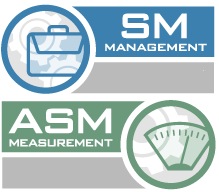SM/ASM 2002 - Software Management & Applications of Software Measurement

PRESENTATIONS
|
Mentors, Models, and the Making of Managers: Special Panel Discussion
Each of us has a story about how we came to be managers in software organizations. Many of us became managers because we were good developers. Some of us studied management in school. A few of us were groomed and mentored by the companies we work for, and some were tapped for management because we were the only warm body available. But now that we're here, what does it take to become an effective manager? Is being mentored and developed as a manager considered a luxury? |
|
|
Orthogonal Defect Classification at Cisco
This presentation outlines the history of the Orthogonal Defect Classification system deployment at Cisco. |
|
|
Problem Resolution Cycle Time Optimization
No matter how well we plan and execute software development, defects are generated and can escape to the customers. Failure to quickly resolve software problems leads to negative consequences for our customers and increases internal business costs. A quick deterministic |
|
|
Project Management in the e-World
Successful project management in today's e-world depends on more than just solid project planning and tracking skills. A thorough understanding of the unique issues and opportunities faced by e-projects, as well as an in-depth knowledge of the scope and integration needs of these complex projects, is essential. |
|
|
Project Management Lessons from the Frontlines
In the natural world, systems tend to go from order to disorder. The same often happens with projects, teams, and organizations. Fortunately, there are things we can do as project leaders to improve our ability to thrive within chaotic project environments. In this session, you'll join fellow project leaders and managers in a frank discussion about practical lessons learned through real-world experience. |

Andy Kaufman, Institute for Leadership Excellence and Development |
|
Put Your Power to Work!
Power is the ability to create value. If you want to create more value in your organization, you must learn to tap the abundant resources of power. The four most abundant power sources are 1) your own inner resources; 2) the physical world; 3) interacting with another person; and 4) working in teams to achieve a shared purpose. Winner of Best Presentation at SM 2001, Dale Emery returns to help you learn to harness your own power resources-for your benefit and the benefit of others. |

Dale Emery, Sun Microsystems |
|
Read My Lips: No New Models!
These days, it seems everyone who wants to make a mark in the software world feels the need to invent a new model or methodology. While such models provide useful frameworks for structuring our thinking and practices, enough already! Karl Wiegers contends we don't need any more new and improved models for software engineering. Rather, we need to encourage a majority of developers to consistently and effectively apply the practices that have already been shown to work. |
|
|
Refocusing Software Development in the New Economy
A changing economy and fiercely competitive market have raised the bar on what we expect from software development efficiency. But are we getting the degree of productivity we expect? Quite often these questions are never answered adequately, and we don't have the measurement systems required to gain the needed insight. Ram Chillarege's presentation highlights some key principles and methods to help project teams gain the reporting edge they need. |
|
|
Requirements Are Requirements Are Requirements - Not!
"This isn't what I need," states Customer Bob. "But it's what you said you wanted," replies Engineer Joe. "It's not right. I need something else." We've all encountered this classic users-don't-know-what-they-want scenario. The fact that software professionals continue to have this same experience over and over again suggests that we're overlooking the real reasons for the user/engineer disconnect. |

Robin Goldsmith, GoPro Management, Inc. |
|
Requirements Workshops: What, Why, and How
There's no standard formula for requirements workshops. Each project, business situation, and group of people will combine to make each workshop unique. Preparing for the requirements workshop requires collaboration. It permits you to tap into the collective wisdom of all of the |

Ellen Gottesdiener, EBG Consulting, Inc. |


